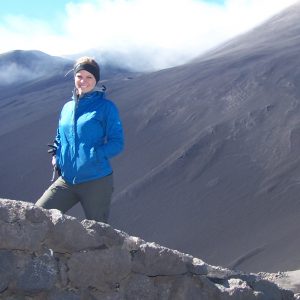
Associate Professor and HCRI Director
Department of Geosciences
Office Phone: 208-426-4154
E-mail: brittanybrand@boisestate.edu
Office: Environmental Research Building 5163
Link to personal web page(s)
Geosciences Faculty Profile
BSU Volcanology Facebook Page
Research Areas
- Volcanology
- Effective hazard and risk communication strategies
- Risk Perception
- Preparedness Behavior
My research in volcanology focuses on understanding the dynamics, run-out distance, and hazard potential of volcanic flows.
My research in natural hazard communication strategies and preparedness behavior explores the influence of cultural variables, perceptions, and adequacy of earthquake hazard information on household emergency preparedness in the Portland Metropolitan Area.
The research objectives include:
- Assessing the influence of media attention to the Cascadia earthquake hazard on household earthquake emergency preparedness.
- Assessing the degree to which different types of hazard maps are accessible and useful to local residents.
- Examining the relative effectiveness of active and passive communication strategies in promoting earthquake risk perception and household emergency preparedness.
- Exploring cultural differences that may influence earthquake preparedness behavior.
The research is based in the Protective Action Decision Model, which integrates approaches in social influence, persuasion, behavioral decision making, and attitude-behavior relationships to demonstrate the phases though which an individual must typically pass before taking preparedness actions. Project Co-PIs are behavioral psychologist Dr. Michael Lindell (University of Washington) and Cultural Anthropologist Dr. Alexa Dietrich (Wagner College).
This project contributes to FEMA’s National Preparedness Mitigation Mission by providing quantitative and qualitative data to address aspects of community resilience, long-term vulnerability reduction, and risk and disaster resilience assessment within the proposed study area. The approach also provides a strategy for breaking down the common disconnect between academic research and practical applications at the emergency management level by working directly with local stakeholders throughout all phases of the project.
Collaboration
I am interested in collaborating on interdisciplinary and cross-disciplinary research and outreach efforts that assess the best practices for communicating natural hazard and risk information to the public in a way that promotes preparedness behavior.
Students
- Carson MacPherson-Krutsky (Ph.D.)
- Nicholas Pollock (Ph.D.)
- Aaron Marshall (Ph.D.)
- Gabriel Garcia (M.S.)
- Patrick Zrelak (B.S.)
- Alex Schweitzer (B.S.)
Teaching
- HONORS 392a: Volcanoes and Society
- HONORS 392b: Natural Hazards, Vulnerability, and Risk
- GEOS 242: Communication in the Earth Sciences
- GEOS 460/560: Volcanology
- GEOS 597: Advanced Physical Volcanology
- GEOS 593: Advanced Field Methods in Volcanology
- GEOS 300-level: Natural Hazards, Vulnerability, and Risk (to be offered in the near future)
Community Partners
- Ada County Emergency Management
- Hazard Ready LLC, University of Montana
- Lewis and Clarke College, Portland, Oregon
- Portland Community College, Portland, Oregon
- Oregon Office of Emergency Management
- Multnomah County Emergency Management
- Washington County Public Health and Emergency Management
- Oregon Department of Geology and Mineral Industries (DOGAMI)
- Listos (Portland, Oregon)